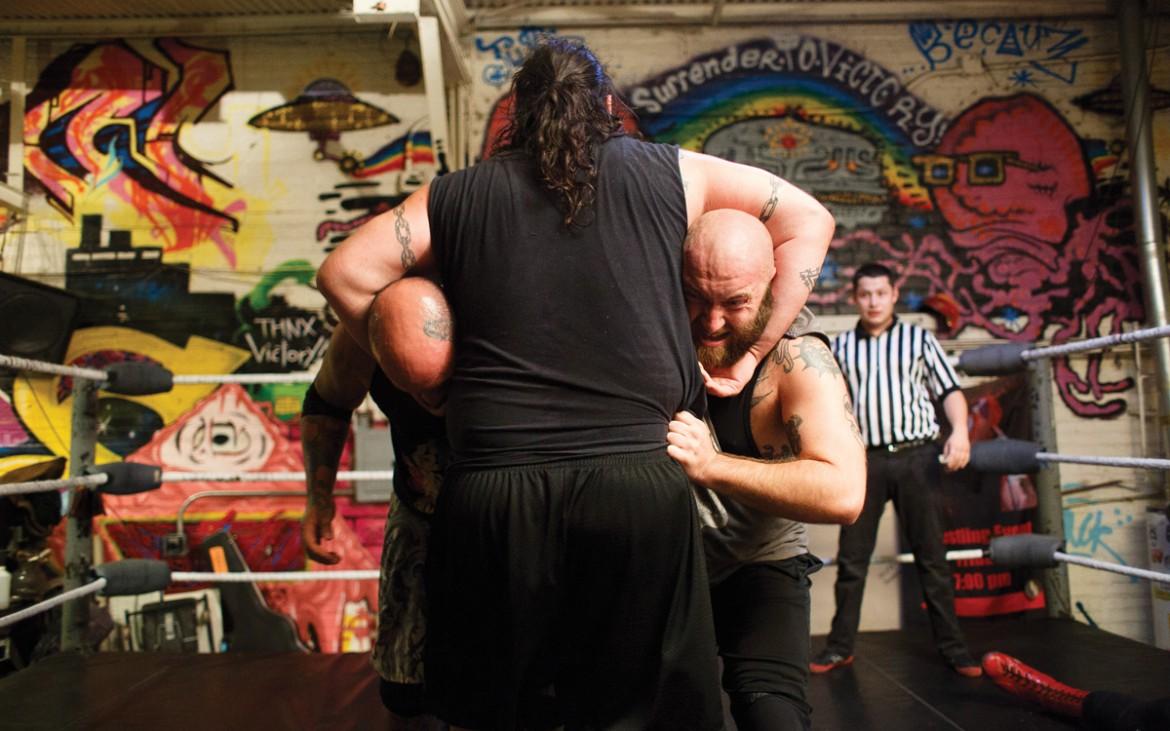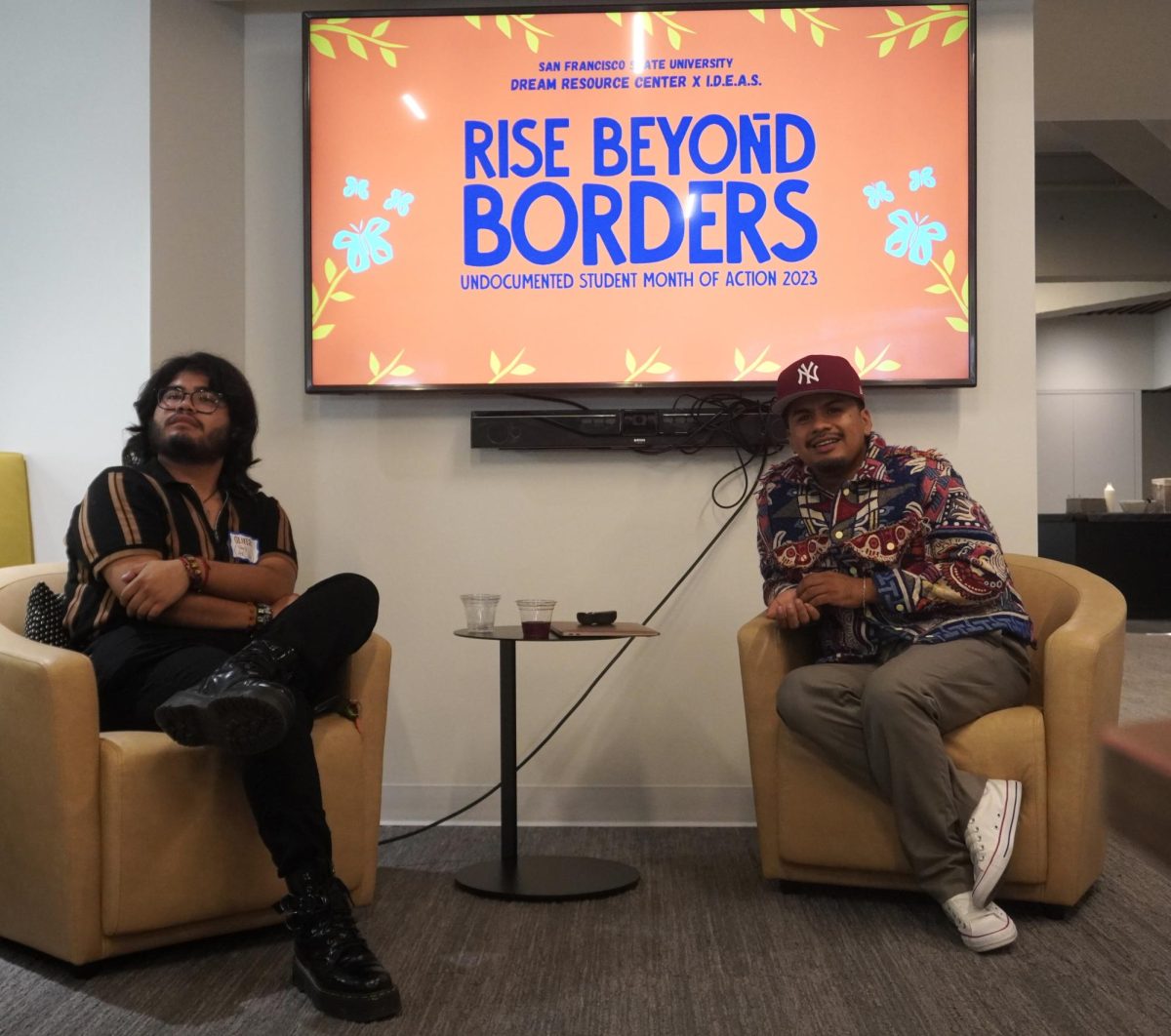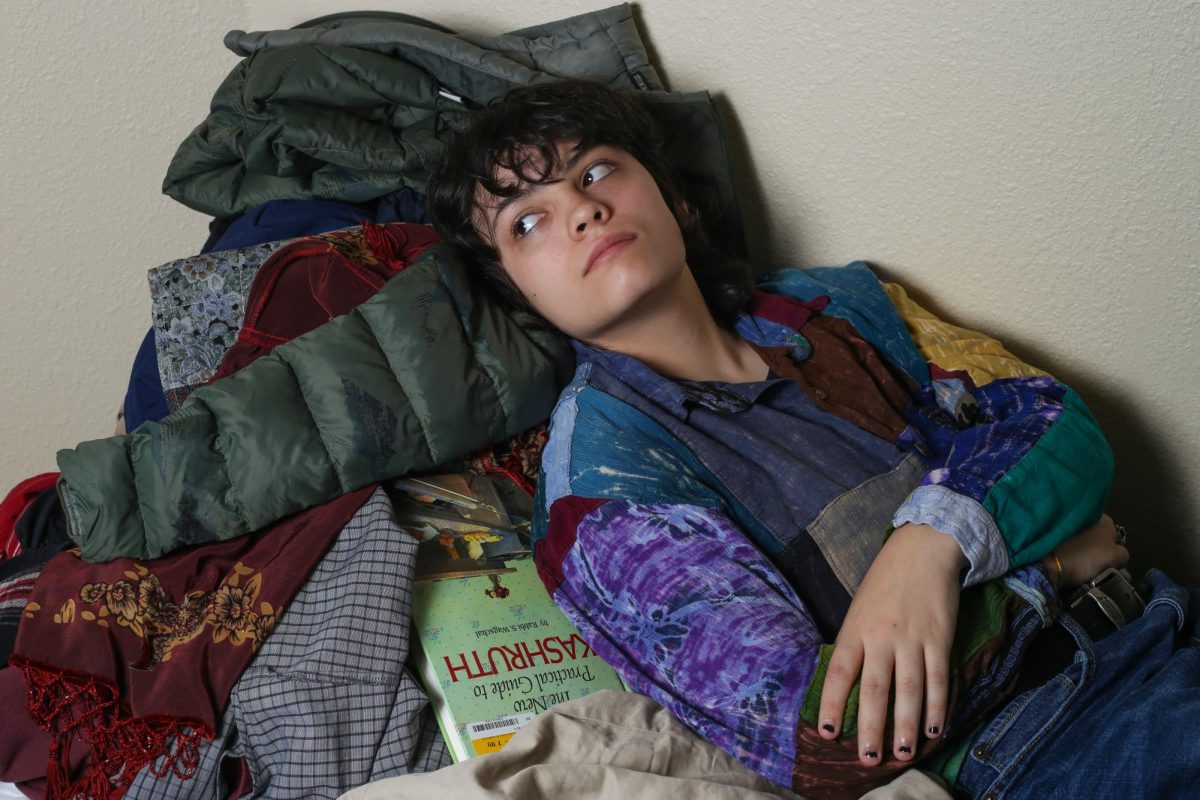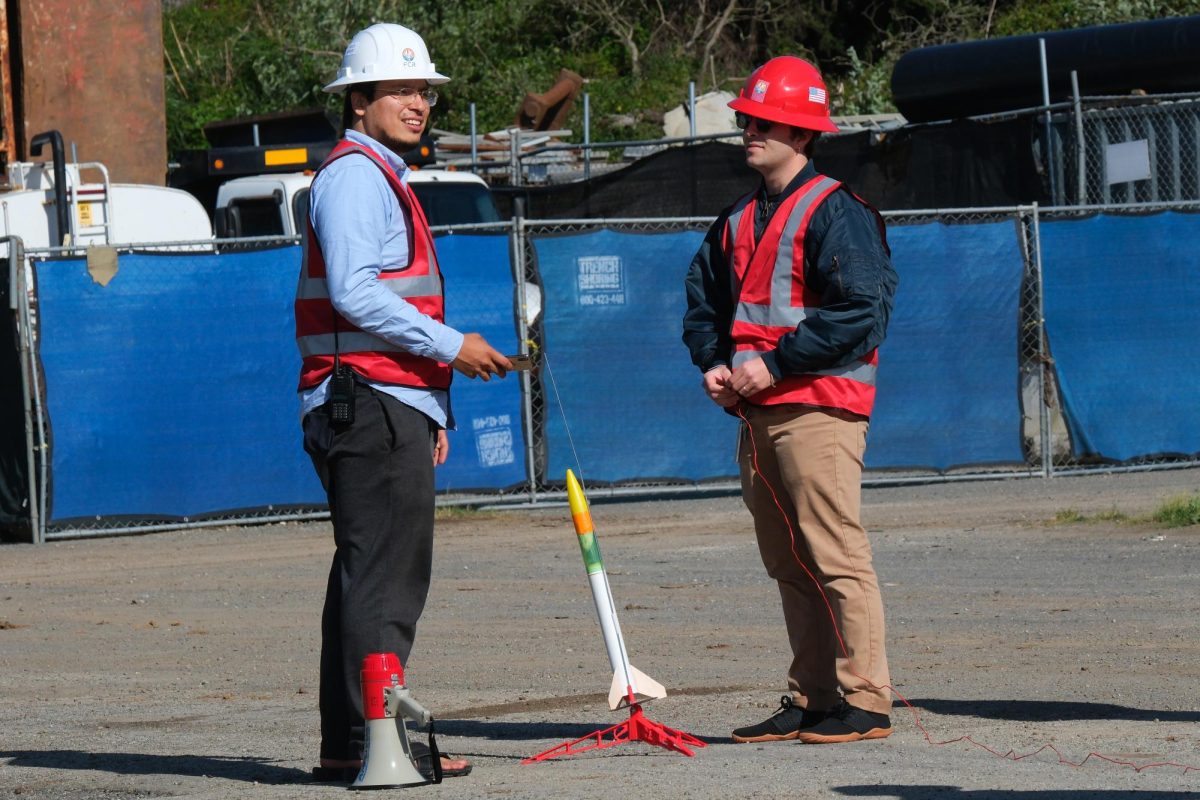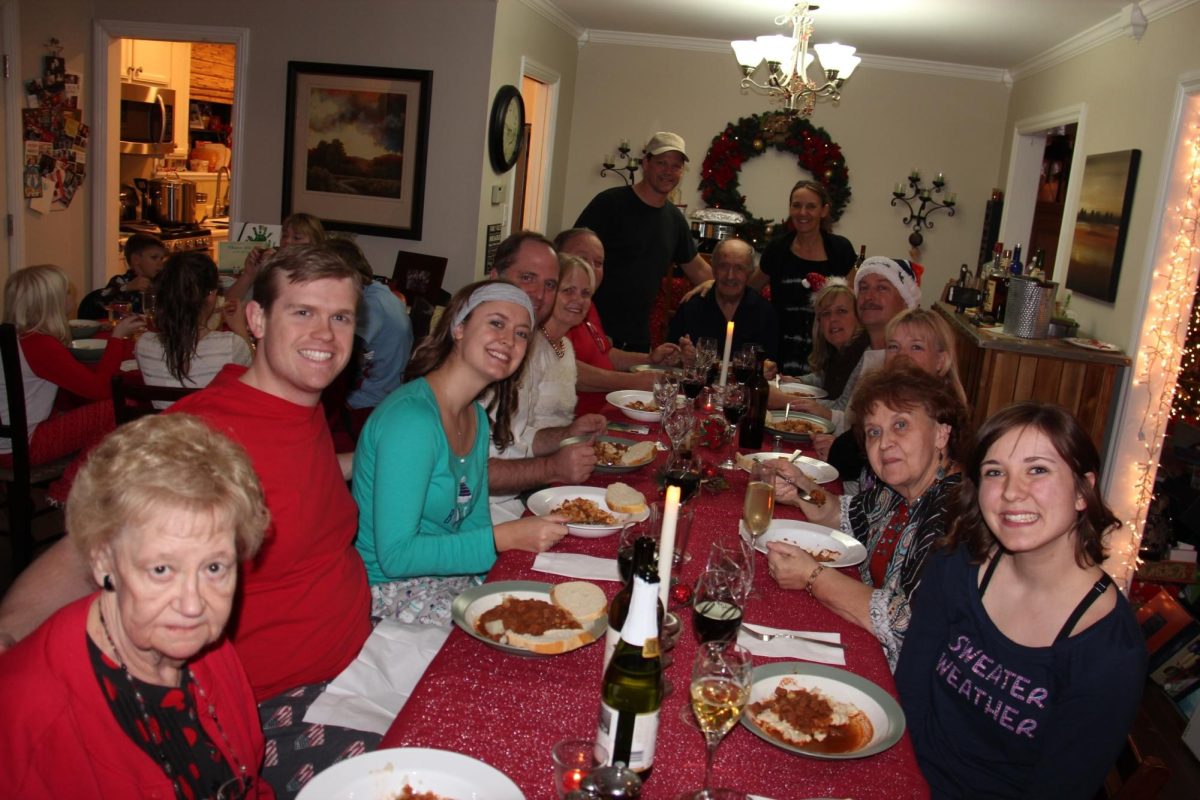Jimi Woodliff, known as “Jimi McMenace,” (right) and Joel “Joe Killmeister” Pacheco (left) are put into a headlock by Dustin “Rick Scott Stoner” Mehl during a practice wrestling match at the Victory Warehouse in Oakland. Photographs by Ryan McNulty
Story by Zak Cowan
[dropcap]I[/dropcap]t was the first Friday of the month and metal was blaring from the speakers of the Oakland Metro Operahouse. Hoodslam occupied the space for the night, bringing with it everything you’d expect from professional wrestling: choreographed bodyslams, acrobatic combat and, perhaps an expectation held for this particular event, plenty of pot smoking.
The performers gathered backstage as the start of the event neared. The members of Stoner University, a faction within Hoodslam that also runs a training school for up-and-coming wrestlers, stood in the center. They continued to go through the feats planned for the night, cramming in every strategy and marijuana hit they could until the venue’s doors opened for the public.
This is Stoner University’s main event, and they’ve been preparing for it all week.
The Stoner Brothers from Ryan McNulty on Vimeo.
Away from the Metro, Stoner University, named after founders Derek and Dustin Mehl’s on-stage moniker, the “Stoner Brothers,” helps conceptualize the characters its dozen-or-so students hope to step into when they’re ready to take the stage. In addition to coaching beginners, the university’s senior members use the week to continue to develop their Hoodslam act.
For Derek and Dustin, training wrestlers at their school is not just a hobby they do in their spare time; this is their career.
“We eat and breathe and sleep and shit and smoke wrestling,” Derek said. “A lot of smoke,” Dustin interjected, pausing, “and wrestling.”
Each brother measures in at 6 feet, 300 pounds, and sports straggly dark hair which has grown past their shoulders and beards which are completely unkempt. The massive brothers own the stage at Hoodslam.
They literally do. They brought it from home.
For the majority of the month, the stage sits in the middle of Victory Warehouse, just a mile from the Metro. Graffiti similar to that found in downtown Oakland covers the walls, and, along with the stage itself, supplies for the show – musical instruments, discoballs and a Hoodslam banner which looms above the stage – are stored in the space where Derek and Dustin have held their lessons for two years.
“It all started because we wanted to train all the time and to better ourselves,” Dustin said. “People have seen that and want to jump in the mix.”
“Stoner U,” he stated intensely, as if on queue. “Home of higher learning.”
[widgetkit id=12733]
Throughout the week, Derek, Dustin and the rest of the university host sessions at the warehouse. Tuesday is beginners day, Wednesday is for more intermediate wrestlers and Thursday is match night. Match night is the time when wrestlers experience the most growth as performers.
“You can’t really prepare for wrestling by doing anything but wrestle,” said Aaron Mitchell, a student under the Stoner tutelage for over a year.
Mitchell, 32, has been training to be a professional wrestler since mid-2012 and has bounced around the Bay Area’s different wrestling schools.
“If you want to get into wrestling at all, you have to go through a school,” Mitchell said.
The learning trajectory at Stoner University fits into this philosophy: wrestle, then wrestle some more.
“If they want to go do cardio and run miles, go to the gym,” Derek said. “When you’re here, you go to the ring. We’ll teach you how to wrestle, and that’s it.”
Focusing on wrestling allows the performers to learn at their own pace and grow in the areas most beneficial to their prospective career paths.
“They gear the training to each individual,” said Chris Crotte, 35, a military veteran who travels to the university from Sacramento. “It’s all wrestling.”

Along with being one’s best route to success, being a part of a wrestling school has given this group unity and a sense of inclusion they haven’t found elsewhere. For Crotte, who went through two tours of duty in Afghanistan, “it’s therapeutic. It’s a good outlet: slam things around and get slammed yourself.”
“I never had that acceptance in life,” Crotte said of the camaraderie at Stoner University. “Everyone wants to be a part of something and feel like they’ve earned it.”
Hoodslam’s wrestlers are the main attraction, but there are other characters of the show that are vital to its continued success. The Stoner Brothers and their team hope to contribute to all of it and are providing training for individuals interested in any part of the show, including referees.
During a wrestling match at Hoodslam, the referee plays the part of a semi-involved mediator, but behind the scenes they prepare just like the other performers. They learn the same stunts as their counterparts, such as flying kicks, leg drops, knee drops, moonsaults and shooting stars. A referee knowing all of this, and being able to perform it, is a vital part in the show as it allows them to know when something goes wrong and react accordingly.
For aspiring performers, learning the art of professional wrestling from those that have extensive experience can be the difference in a bad situation. Shane “Wiggles” Wignall, 24, has been training to be a referee at Stoner University since February.
“If you try to train yourself or if you’re working with people who are untrained, you take the chance of hurting someone,” Wignall said.
In addition to finding an outlet and space for camaraderie, the dozen or so students have found mentors in the Stoner Brothers.
“It’s a family atmosphere,” Crotte said. “It’s like being in a room with brothers; it’s my new brotherhood.”

This inclusive, inspirational atmosphere creates the sort of learning environment the Stoner Brothers hope will elevate their students to where they strive to be.
“We are highly motivated to make pro wrestlers out of our students,” Dustin said, but the brother’s students are getting so much more out of their experience than that.
“When I’m there in the ring, nothing else matters,” Wignall said. “It doesn’t matter that I missed my deadline at work. It doesn’t matter that I’m late on my rent payment. The only thing that matters right then is what’s happening right in front of me.”


